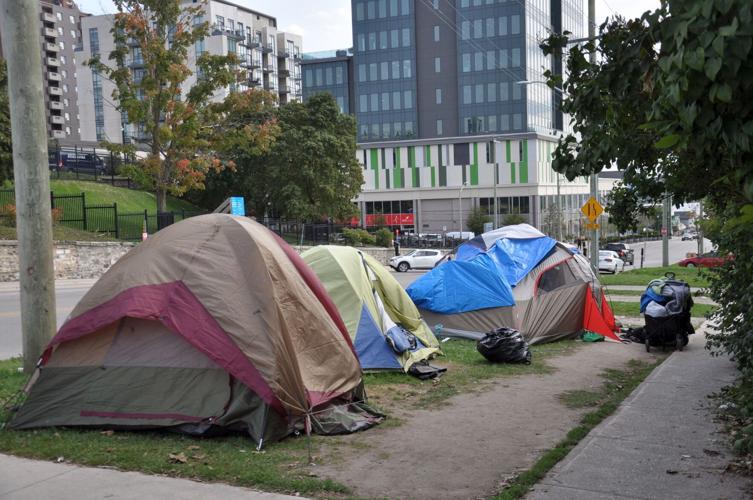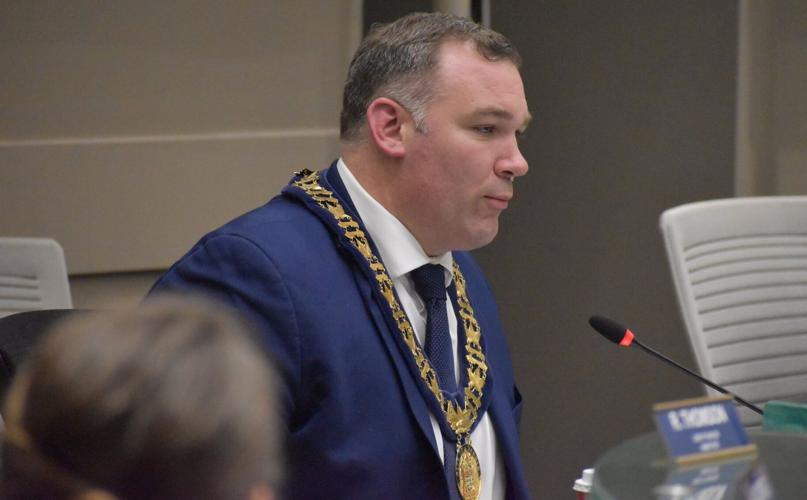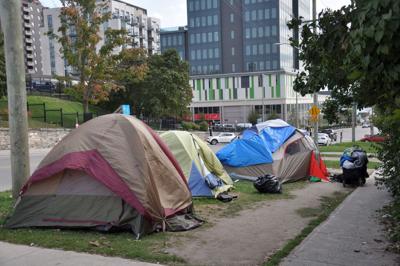In the heart of BarrieÔÇÖs historic downtown, the intersection of Mulcaster and McDonald streets is surrounded by tents and abandoned shopping carts, many brimming with peopleÔÇÖs belongings.
People duck in and out of the makeshift homes, which sit across from a drop-in and emergency respite centre for those experiencing homelessness. Some have a beer while seated on the curb while others smoke out of glass pipes.
Such scenes spurred Barrie Mayor Alex Nuttall to declare a state of emergency on Tuesday morning, in response to the city’s homeless encampments and the ongoing opioid crisis.
Under the declaration, Nuttall said the city will remove encampments, beginning with the ones nearest “critical infrastructure” and public spaces.
The city will also request Simcoe county open additional shelter space for those living in the encampments. The emergency declaration covers city-run public spaces such as parks, sidewalks, trail systems and boulevards. 
ÔÇťSince day one I have been clear that encampments are not acceptable in the city of Barrie. We are here to help those who want help and there are resources available today. If you refuse that help you cannot stay in these encampments,ÔÇŁ said Nuttall, flanked by a number of city councillors during a news conference.┬á

Under the declaration, the mayor said the city will remove encampments beginning with the ones nearest “critical infrastructure” and public spaces, and gain the ability to hire more staff and contractual services.
Chris Simon/Metroland file photoNuttall said homelessness, mental health and drug use are complex issues that have had a “measurable, significant and detrimental impact” on city land and the surrounding communities. He said people have been dealing with homicides, fires, overdoses, thefts, assaults and excessive E. coli levels in the city’s waterways┬áas a result of the encampments.
Last year, a dozen mayors, including Nuttall, appealed to Ford to enact tougher laws to help them deal with encampments to ensure any efforts arenÔÇÖt overturned by the courts. Ford has threatened to use the ConstitutionÔÇÖs ÔÇťnotwithstanding clauseÔÇŁ to override any such rulings that would thwart the removal of tents from parks. The Tories passed legislation in June to give municipalities and police increased funding and ÔÇťenhanced legislative powersÔÇŁ to deal with the crisis.
Throughout the downtown, Barrie residents who spoke to the Star on Tuesday were acutely aware of the cityÔÇÖs challenges with homelessness, but said itÔÇÖs not a new problem.
ÔÇťAs soon as the pandemic was over, it was everywhere. You couldn’t walk somewhere without seeing someone sleeping on the side of the road,ÔÇŁ said Brielle Ransom, who has lived in Barrie┬áfor 24 years. She said one of her cousins is living in an encampment and she finds the situation ÔÇťheartbreaking and devastating.ÔÇŁ
Barrie┬áresident┬áPaul Martin, seated on a friendÔÇÖs front yard, called the situation troubling, but added that he believes the city has been ÔÇťdeterioratingÔÇŁ for some time and that it’s time for other levels of government to step in.
Approximately 600 homeless people are living in Barrie, according to city estimates, though Nuttall said he believes the number could be higher. “The number of individuals living unhoused and/or in encampments has significantly increased in the city of Barrie since the COVID-19 pandemic,” Nuttall said┬áin declaration of emergency┬ádated Monday.
The declaration cited a “heinous crime” in which┬átwo men who lived at a Barrie encampment were killed and dismembered in what police have called an isolated and “not random” incident. A 52-year-old man who lived at the encampment and was known to police has been charged with more than two dozen offences, including first and second-degree murder and two counts of indignity to a dead body.
Following the deaths and a police investigation, the province’s Ministry of the Environment, Conservation and Parks issued an order to the city to clean up the encampment site because the amount of hazardous waste could cause serious harm to the community, Nuttall said .
“We are not looking for additional suspects or looking for additional victims, but (the
Nuttall said the city┬áwill┬ábe immediately testing all waterways near encampments to understand how connecting ones, including Barrie’s lakefront, are being contaminated with human feces, resulting in “incredibly high” E. coli readings. He requested immediate funding from the province to help the city carry out the planned initiatives.
Jonathan Godfrey, who lived in a tent in a nearby park last summer but has since found his way into supportive housing, said people come here because they know they wonÔÇÖt be hassled. He still comes by to check on his friends.
ÔÇťThis is the one place where weÔÇÖre welcome ... thereÔÇÖs no judgment here,ÔÇŁ he said. ÔÇťAnd the judgment is one of the things that really makes us want to just hide in the tent and not ask for help.ÔÇŁ
Godfrey added that ÔÇťit’s not like any of us want to live here on Mulcaster Street. The problem is too many people have nowhere to go.ÔÇŁ
While Barrie does have several homeless shelters, including the Busby Centre and Salvation Army, community members said they have mixed experiences.
Shawn Allan, who stays at the Busby Centre, a shelter and drop-in, said he feels the city has adequate supports but that not everyone is willing to stay in a shelter. He added he doesnÔÇÖt feel the encampments are safe or dependable.

ÔÇťThe programs are there but people are not stepping up to access them,ÔÇŁ said Shawn Allan, who stays at the Busby Centre, a shelter and drop-in in Barrie. ÔÇťI donÔÇÖt think public streets are a place for them.”
Omar Mosleh/╔ź╔ź└▓ StarÔÇťThe┬áprograms are there but people are not stepping up to access them,ÔÇŁ Allan said. ÔÇťI donÔÇÖt think public streets are a place for them.”
Ryan O’Rourke, fresh out of treatment and celebrating 40 days of recovery from fentanyl, said finding a shelter space is easier said than done.
ÔÇťThey donÔÇÖt have nearly enough beds,ÔÇŁ he said, sharing a story of how he was driven to Orillia, about 30 minutes away, to stay at a warming shelter there when local shelters were full.
O’Rourke,┬áwho credits Barrie’s┬á╔ź╔ź└▓less and Addiction Recovery Treatment Hub for helping him get back on his feet, has lived in Barrie for more than 40 years on and off and said “it doesn’t feel like home anymore.”
According to Nuttall, Barrie has received an 86 per cent increase in homelessness prevention funding in the last few years, while the average across Ontario sits around 45 per cent.
“We do not have a funding problem, we have an inability to be effective problem,” Nuttall said, adding that services like rehabilitation are taking too long.
































To join the conversation set a first and last name in your user profile.
Sign in or register for free to join the Conversation